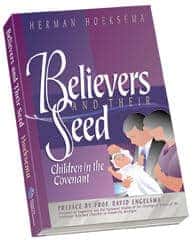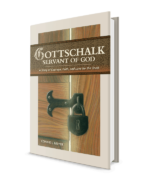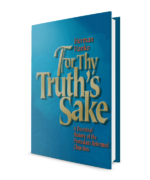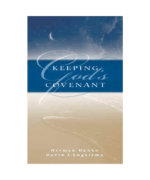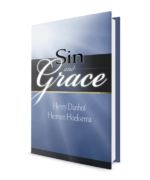Believers and Their Seed is not a book designed to prove infant baptism over against the baptist position. It is a book for those already convicted of the truth that “The baptism of young children is … to be retained in the church, as most agreeable with the institution of Christ” (Article 24 of the Thirty-Nine Articles). Herman Hoeksema grounds infant baptism in the covenant of grace with believers and their seed which in turn is rooted in the covenant life of the Triune God, “a life of the most intimate communion of love and friendship, resting in the unity of God’s Being and living through the personal distinction[s]” of the Father, Son and Holy Spirit (p. 61).
As well as grounding infant baptism in God’s covenant, Hoeksema draws out the relationship between infant baptism and election and the doctrines of grace. Thus he opposes a “conditional” covenant (chs. 1-2) and baptismal regeneration (chs. 3-4) and deals with the difficult pastoral issue of covenant children who die in infancy (ch. 11).
Believers and Their Seed has helped a lot of people understand infant baptism more deeply and been of great comfort to believing parents. The proper understanding of the covenant also helps to preserve Reformed, Presbyterian, Anglican and Congregational churches from the incursion of baptistic thinking (pp. 4-5) and the modern practice of infant “dedication” services. For those less familiar with some of the controversies between paedobaptists (chs. 1-4), it may be best to read the positive treatment of God’s covenant and infant baptism first (chs. 5-11).
This book can also be read on-line.
Click here to read this book in Dutch.
Click to read chapter 5 and chapter 6 in Italian.
REVIEW
Believers and Their Seed: Children in the Covenant, by Herman Hoeksema. Grand Rapids: Reformed Free Publishing Association, revised edition, 1997. 166 pages (hard cover). [Reviewed by Rev. D.H. Kuiper.]
There are really only two views of the covenant of grace. One view holds that the covenant of God is unilateral. The other view is that it is bilateral. That the covenant is unilateral or one-sided means that God is sovereign in every aspect of the covenant: He conceived of it, established it, maintains it, and perfects it. There are not two parties in the covenant, but one, and that is God. There are two parts to the covenant, God’s and man’s; but God performs His part, and also works man’s part by the power of His grace. The other view of the covenant, bilateralism, has God and man in contract or agreement. Each has a work to perform. When God does His part and man does his part then the covenant is successful. In this book Herman Hoeksema argues successfully that the covenant is unilateral. And he shows that all other views are essentially bilateral, and as such partake of Arminianism to one degree or another.
From a certain point of view, Believers and Their Seed is Hoeksema’s most important book, for it sets forth his greatest contribution to Reformed theology. At the same time, the view of the covenant developed here sets forth the heart of Protestant Reformed theology; if anyone wants to know what these churches stand for, in distinction from other Reformed denominations, this book will make that clear. As the sovereignty of God is the great truth that underlies and unifies the five points of Calvinism, so the sovereignty of God is the basis of Hoeksema’s understanding of the covenant. God is God! Salvation is of the Lord alone! And salvation, the covenant, and the grace of God revealed therein, are only for the elect whom God has chosen in eternity and unconditionally.
Because Hoeksema was intellectually honest and thoroughly committed to Holy Scripture and the Reformed confessions, it is safe to say that his insistence on particular grace assisted him in developing a view of the covenant that was biblically grounded and in harmony with the genius of the confessions. It is striking that in 1927, only three years after he was expelled from the Christian Reformed Church for opposing the theory of common grace, he set forth his covenant view in eleven editorials in the Standard Bearer. Those editorials form the contents of this book, first published in the Dutch language, then in an English translation in 1971, and now in this attractive reprint. This volume also contains a twenty-six page preface by Prof. David Engelsma which gives a biography of Hoeksema and a thorough introduction to the book itself.
As Prof. Engelsma points out, the significance of the book is that it makes six points about the covenant, points we believe Reformed churches need badly to hear today. 1) The essence of the covenant is friendship, friendship between God and His people through the work of Jesus Christ. And this friendship is to be traced back to the triune life of God Himself. God is the covenant God because He enjoys a life of friendship, first within Himself, and then with His people. 2) Included in this covenant life are the children of believers, for God saves His church in the line of continued generations. And for this reason infants are to be baptized. 3) There is one church throughout the ages, one covenant under Old and New Testament forms. Baptism has replaced circumcision. Infants must receive the token of the covenant. 4) The covenant is established only with the elect. Here we see Hoeksema faithful to the Canons of Dordt as he applies the doctrines of grace to the covenant. Because believers bring forth a twofold seed, the elect and the reprobate, it is necessary to distinguish the covenant from the sphere of the covenant. Only elect children of believers are in the covenant of grace. The Esaus in the church are not in the covenant, but are merely in the sphere of the covenant for which they are judged the more strictly. 5) The doctrinal struggle of 1953 must be seen as a controversy over the covenant: Would the Protestant Reformed Churches remain faithful to her historical moorings, or would she adopt bilateralism as regards the covenant? Hoeksema shows that the Christian Reformed view of the covenant was basically the same as that espoused by Dr. K. Schilder and the Liberated Churches, and therefore must be rejected. And 6) Hoeksema rejects the Kuyperian notion of presupposed regeneration as the reason for the baptism of infants. It is a mystery of modern church history that time and again Hoeksema and the Protestant Reformed Churches are charged with maintaining presupposed regeneration.
I have used the book to study the doctrine of the covenant twice, once with the adult members of a small congregation and once with older young people and young adults. Both times the experience was profitable and enjoyable for all concerned. We encourage others to study this important book, either personally or in society. Such a study will send us to Holy Scripture to learn what it means that God is the covenant God, and why the covenant is called the covenant of grace. Such a study, humbly and prayerfully undertaken, will be an act of friendship.
Many years ago an older pastor advised me to read Chapter 5 of the book before all the other chapters. In Chapter 5 the “Meaning of the Covenant” is set forth. With that in mind the other chapters are more understandable. We found that to be true, and pass the suggestion on for your consideration.
“I found Believers and Their Seed by H. Hoeksema really lovely.” – Yorkshire, England
“I finished reading Herman Hoeksema’s Believers and Their Seed a couple of days ago and found it helpful as well as food for the soul.” – Co. Antrim

